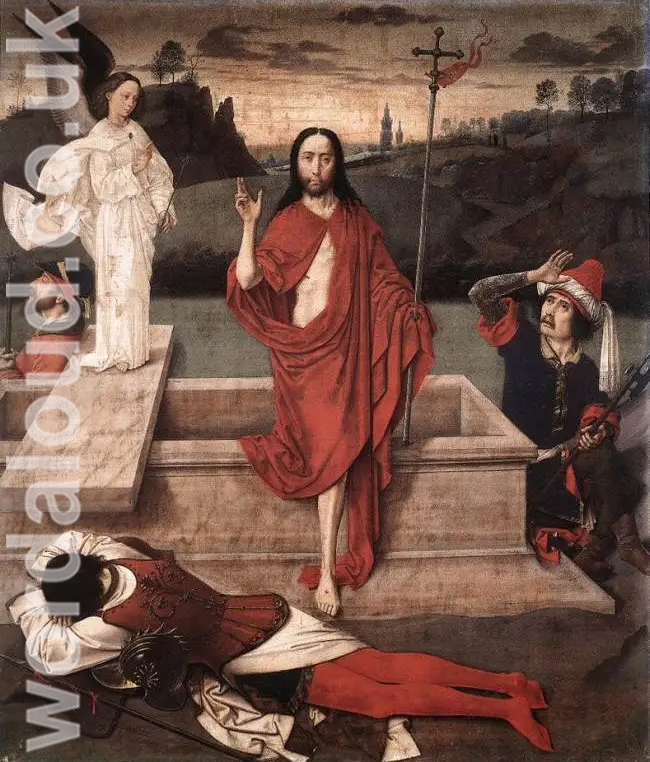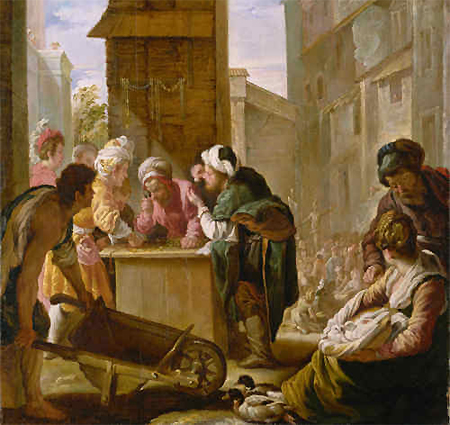Christian Art | A Life In Jesus Christ
Office Of Readings | Week 16, Wednesday, Ordinary Time | A Reading From The Imitation Of Christ | The Kingdom Of God Is Peace And Joy In The Holy Spirit
‘The kingdom of God is peace and joy in the Holy Spirit.’
We are invited to turn to God, to seek intimacy with Christ within the soul, and to place ultimate trust in God rather than in worldly concerns. At its heart, the text speaks of the inward kingdom — ‘the peace and joy of the Holy Spirit’ — which exists not in external circumstances but in the soul prepared for God’s indwelling.
Turning To God With The Whole Heart
The exhortation to ‘turn to the Lord with your whole heart and leave behind this wretched world’ reflects a core concern of The Imitation of Christ: that true peace cannot be found in created things, but only in God. This is not a rejection of the material world in itself, but a rejection of worldly attachments that distract or deceive.
The idea that the soul will ‘find rest’ echoes Augustine’s famous line: ‘Our heart is restless until it rests in You.’ In both cases, spiritual rest is not passive, but the fruit of active surrender to God.
Indwelling Of Jesus Christ
The text emphasises the intimacy of the soul’s union with Jesus Christ. Christ is not only to be followed externally, but welcomed inwardly: ‘His glory and beauty are within you, and he delights in dwelling there.’ This interior indwelling is grounded in scripture — specifically, John 14:23: ‘If anyone loves me, he will keep my word, and my Father will love him, and we will come to him and make our home with him.’ For Thomas à Kempis, the Christian life is not merely moral, but mystical. Christ desires to dwell in the believer’s heart, not abstractly, but in personal closeness — bringing consolation, peace, and a ‘wonderful intimacy’.
The soul is invited to become a spouse to Jesus Christ, evoking nuptial imagery common in Christian mysticism (e.g., the Song of Songs, Saint Bernard of Clairvaux, and Julian of Norwich). This is not romanticism, but a way of describing total, loving union.
Trusting Entirely In God
A central theme is reliance on God rather than on other people or material supports. ‘He himself shall provide for you and faithfully administer all your cares.’ This resonates with Matthew 6:25–34, where Christ commands his followers not to worry about tomorrow, for the Father knows what they need.
Such trust does not mean irresponsibility, but a willingness to surrender anxiety, pride, and self-reliance. It’s an invitation to recognize that Christ is ‘sufficient’, a spiritual wealth that outweighs all material provision.
Pilgrimage And Restlessness
The line ‘You have here no lasting city’ comes directly from Hebrews 13:14, and it encapsulates a major theme in the Christian spiritual tradition: that life on earth is a pilgrimage towards the true homeland — union with God. The Christian is a stranger in the world, called to live by the values of a heavenly kingdom.
This spiritual homelessness explains the soul’s restlessness when not grounded in Christ. The soul is not at peace because it is not yet at home. Only ‘intimate union’ with Christ can bring true rest.
Contemplation Of Christ’s Passion
Recognizing that not all are immediately able to ‘contemplate the glory of heaven’, the author wisely directs the soul to Christ’s Passion: ‘Dwell willingly in his sacred wounds.’ This is profoundly practical advice. In moments of spiritual dryness or distraction, meditating on the sufferings of Christ can anchor the soul in God’s love and draw it into deeper compassion and solidarity.
Here, we see a convergence with the thought of Saint Ignatius of Loyola and Saint Francis of Assisi, both of whom encouraged meditation on Christ’s Passion as a path to union with him.
Love That Transforms Self-Concern
Finally, the passage describes a remarkable transformation of priorities: ‘You will not care about your own convenience… you will rejoice all the more in insults and injuries.’ This radical statement recalls the Beatitudes — ‘Blessed are you when people insult you…’ (Matthew 5:11) — and suggests that love for Christ reorients the soul’s desires. Rather than seeking comfort or human praise, the Christ-filled soul delights in self-forgetfulness, because it is caught up in a greater love.
This is not spiritual masochism, but a sign of a person whose identity is no longer centred on the ego but on Christ.

A Reading From The Imitation Of Christ | The Kingdom Of God Is Peace And Joy In The Holy Spirit
Turn to the Lord with your whole heart and leave behind this wretched world. Then your soul shall find rest. For the kingdom of God is the peace and joy of the Holy Spirit. If you prepare within your heart a fitting dwelling place, Christ will come to you and console you.
His glory and beauty are within you, and he delights in dwelling there. The Lord frequently visits the heart of man. There he shares with man pleasant conversations; welcome consolation, abundant peace and a wonderful intimacy.
So come, faithful soul. Prepare your heart for your spouse to dwell within you. For he says: If anyone loves me, he will keep my word and we shall come to him and make our dwelling within him.
Make room for Christ. When you possess Christ you are a rich man, for he is sufficient for you. He himself, shall provide for you and faithfully administer all your cares. You will not have to place your hope in men. Put all your trust in God; let him be both your fear and your love. He will respond on your behalf and will do whatever is in your best interest.
You have here no lasting city. For wherever you find yourself, you will always be a pilgrim from another city. Until you are united intimately with Christ, you will never find your true rest.
Let your thoughts be with the Most High and direct your prayers continually to Christ. If you do not know how to contemplate the glory of heaven, take comfort in the passion of Christ, and dwell willingly in his sacred wounds. Endure with Christ, suffer for him, if you wish to reign with him.
Once you have entered completely into the depths of Jesus, and have a taste of his powerful love, then you will not care about your own convenience or inconvenience. Rather you will rejoice all the more in insults and injuries, for the love of Jesus makes a man scorn his own needs.
Christian Prayer With Jesus
Lord Jesus Christ,
You are the peace of my heart and the joy of my soul.
Teach me to turn away from all that distracts and deceives,
And to prepare my heart as a dwelling place for you.
Fill me with trust in your care,
With courage to suffer with you,
And with love that forgets itself.
Let me live this day as a pilgrim,
Moving towards the eternal home of your glory.
Amen.
Glossary Of Christian Terms
Thomas à Kempis – A 15th-century German-Dutch canon regular and member of the Devotio Moderna movement. He is the author of The Imitation of Christ, a deeply influential spiritual work focused on humility, detachment from the world, and union with Christ.
The Imitation of Christ – A devotional book written by Thomas à Kempis in the early 15th century. It emphasises the interior life, the imitation of Christ’s humility and suffering, and the pursuit of spiritual rather than worldly goals.
Devotio Moderna – A late medieval reform movement that stressed personal devotion, inner piety, and practical Christian living. It influenced writers like Thomas à Kempis.
Kingdom of God – In Christian theology, the spiritual reign of God over hearts and lives; not merely a future reality, but something that begins within the believer through peace, righteousness, and joy in the Holy Spirit.
Pilgrim – A metaphor for the Christian life, implying that believers are on a journey through the temporal world toward their true home with God in heaven.
Contemplation – A form of prayer in which one silently and lovingly focuses on God, especially on Christ’s passion or divine presence, seeking union rather than words.
Passion of Christ – The sufferings of Jesus in the hours leading up to and including his crucifixion. A central focus of Christian meditation and devotion.
Sacred wounds – Refers to the five wounds Christ received during his crucifixion. Meditating on them is a traditional way of entering into Christ’s suffering and love.
Spouse of the soul – A traditional mystical image describing the close, loving union between Christ and the believer, often using language of marriage to express spiritual intimacy.








